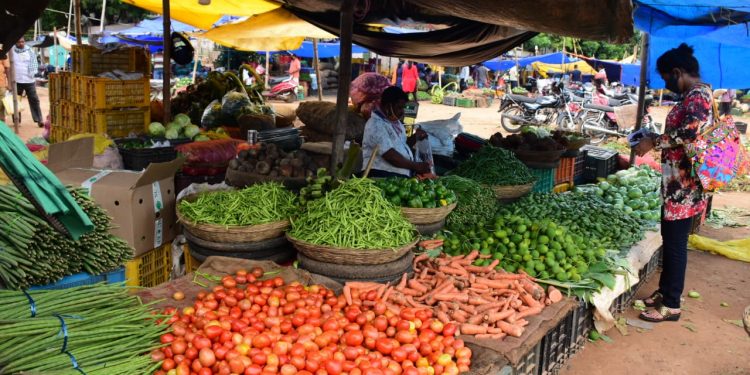Vegetable prices have gone through the roof. So much so, that an average middle-class consumer has been forced to cut down on his daily vegetable intake. Most people hesitate to visit markets. The price terror has come on top of vanishing jobs and truncated salaries triggered by a Covid-19 induced lockdown. Every consumer item starting from cereals, edible oils to vegetables sells at nearly 50 per cent more than their pre-pandemic rates. People, who used to spend Rs 800 a week on vegetables, now have to spend around Rs 1,500 a week. The price shock has worsened the miseries of the common man. Prices of onion and potato are rising when tomato has become the latest bugbear. Onion rules over Rs 80 a kg in the local market, while potato costs Rs 45/kg. Every vegetable, both locally produced and those coming from outside, has gone out of the reach of people. Prices of brinjal, beans, potato, carrots, green chilly et al are now out of bounds. Even ‘untouchables’ in the market like pumpkins, gourds, arum, snake gourds, Malabar spinach, ivy gourds from whom people turned away and that were available at throw-away prices have gone up in their standing. Each of these vegetables commands not less than Rs 60 a kg. The reason dished out for the price rise is their short-supply from producing regions.
Despite its highfalutin efforts over years, the state government has failed to protect ordinary people from the vagaries of price volatilities of kitchen essentials. Such price shocks are not new in the state. But, unfortunately the government has not learnt a thing or two from its failures. Our farmers are no less hardy and industrious than farmers of other states. If provided with wherewithal and facilities, there is no reason why we cannot become self-sufficient in vegetables. Odisha is endowed with a suitable climate and soil to produce enough kitchen staples like potatoes and onions besides other vegetables. Farmers in Bolangir, Boudh and Kandhamal have shown that we can produce good quantities of onions. However, we continue to depend on others states for our daily quota of essentials such as onions, potatoes, fish and eggs. The failure of the government to generate enough farm produce could be made good of if we had proper agriculture infrastructure like warehouses and cold-storages to preserve perishable commodities. The government has failed on this count also. In the absence of the state-promoted scientific warehouses and market linkages, out farmers shy away from growing cash crops like vegetables. They prefer to grow only those commodities that come under minimum support price (MSP). There are scores of policies but they mostly remain on paper. For onions, we continue to depend on Maharashtra and Andhra Pradesh while West Bengal gives us potatoes. We look to Andhra Pradesh for our fish and eggs quotas. The much-talked-about Potato Mission of the state government has flopped. Matters could be compounded in the future once the amended farm Acts are implemented here. Under the changed laws, potatoes and onions have been kept out of the ambit of the Essential Services Maintenance Act.
Onion prices have surged after crops were damaged due to rainfall in various parts of the country, especially in Maharashtra. However, with Unlock 5.0 here, inter-state transportation has resumed and there is free flow of labour. The rain may have caused temporary delays in supply of vegetables. But vegetable prices have been soaring for over a year now. The rising inflation is a result of the consistent price rise over months. We can see a peculiar phenomenon. Inflation is going up even as people have no money to purchase things. This is high time the state produced enough vegetables to meet its own requirement and set up warehouses and cold-storages to preserve them. Perishable items such as vegetables cannot be imported all the time. The government should develop proper infrastructure and logistics to ensure seamless flow of farm produce. Or else, there will be no end to the miseries of the common man.






































